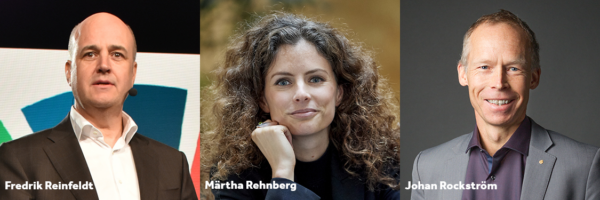The 10th edition of “A Sustainable Tomorrow”, the biggest digital sustainability conference in the Nordics, took place on September 15 in Sweden and reached an audience of 20,000 engaged participants via strategic hubs throughout the Nordics. It is a modern forum that unites experts, inspirational speakers, the business world and politicians for a more sustainable society.
Business is an important engine for sustainable development and sustainable business drives the transition and gives power to other social actors. The event initiated the European Sustainability Week, ESDW 2023, which starts today on September 18.
DISRUPTION DRIVES THE SUSTAINABLE TRANSITION
Everything is based on the 17 Goals for sustainable development and this year’s theme for the conference was “Disruption”, rapid actions in society that can best be described as radical changes in mindsets, actions and path choices to achieve new results. Disruption is the key to much of what we have today and disruptive thinking can be applied to various businesses and drive the sustainable transition.

Photo source: https://asustainabletomorrow.com.se/arets-konferens/
This year’s keynote speakers included some of Europe’s most prominent lecturers in the field: Johan Rockström, Märtha Rehnberg and Fredrik Reinfeldt.
LET’S NOT PASS TIPPING POINTS WITH NO RETURN
Johan Rockström, professor of environmental science and director of the Potsdam Institute for Climate Impact Research, a world-leading center for climate and sustainability research, gave a good insight into and status update of climate impact and its development today as well as what the changes mean for the future. He talked about the danger of passing “tipping points”, where climate change and its impact on our world are irreversible. Rockström stated that comprehensive targets and action plans exist at a global level, but that the rate of change is too slow. The big challenge is to accelerate and scale up the actions.
INNOVATIONS THAT MIMIC NATURE GIVE US NEW TOOLS
Märta Rehnberg, a visionary entrepreneur with a strong climate commitment and one of the founders of the Copenhagen-based think tank DareDisrupt, provided inspiration through examples where entrepreneurship and technological development provide smart and hopeful sustainable solutions. Innovations that mimic nature can give us new tools. The 100 % climate neutral BIQ building in Hamburg, where photosynthesis through microalgae introduced in glass panes is used for energy production and regulation of indoor light conditions, is one such case study.
Rehnberg emphasized the importance of not “overengineering” products, but evaluating what product features and functions provide real added value for the customer. In product development, it is sometimes necessary to take a step back and immerse yourself in the customer’s world. It takes a deeper understanding of the problem and its limitations as well as the solutions and their implications to create a product that serves its true purpose. “Sunk Cost Fallacy”, the investments already made in a certain system or a certain solution, is one of the biggest obstacles Rehnberg sees for disruption and innovation in companies. “It is often not the future but the history that burdens us with its costs”. To dare to think in a new way, change direction and make a clear departure from the beaten track is a disruption that leads to innovation.
IN DISCIPLINE ONE FINDS THE DEPTH TO ENABLE CHANGE
Fredrik Reinfeldt, with extensive experience in politics (Prime Minister of Sweden 2006–2014) and today an active lecturer, presented a global analysis based on the theme Disruption. Solid UN reports show progress, the peak has been reached and the world’s emissions are declining – not only in the West, but also in many of the larger countries of the 3rd world. “The process is underway, the plan is initiated, and we are moving in the right direction,” Reinfeldt stated. However, the pace is too slow. It is of course easier to set ambitious goals for a more distant future than to implement concrete disruptive measures within the short time frame. It is important to make the decision, stay the course and just start implementing it. “It is in the discipline one finds the depth to enable change,” Reinfeldt explained.
The way forward is found in dialogue and in some form of consensus. Parties with different opinions and priorities need to meet in the middle of the bridge, so to speak, to listen and take in each other’s different perspectives to be able to find a viable middle ground that still leads in the same direction. It is important to consider the scope of engagement and action. It is when something has global impact that the change really happens.
In recent years, Reinfeldt has seen a major positive change in towards increased sustainability in the business world. The progress is significant, but the politics must be in place. Visions are also the responsibility of politicians, to clearly explain and visualize what the goal is and why it is important. “It is difficult to get someone to board the train, if the destination is unknown,” Reinfeldt concluded.
A SUSTAINABLE TOMORROW STARTS TODAY
The lecturers came together in an interesting panel debate and the day ended with some inspiring words from Bo Nilsson, founder of “A sustainable Tomorrow”: “A sustainable tomorrow begins today. It is made possible by the choices we make NOW in our every day lives.”






